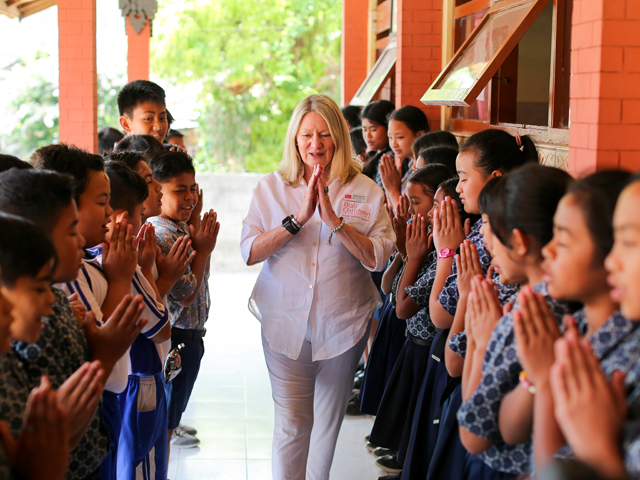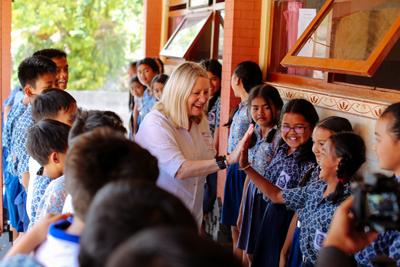Margaret Barry Bali Children's Foundation Interview

A Fascinating Life and Job
Born into a family of teachers in South-East Gippsland and now based in Bali for over 20 years, Marg started off as a fashion entrepreneur - she owns and manages a highly successful fashion, gifts and homeware business, MAGG Bali. Marg had no experience in education or international development when she started the Bali Children's Foundation 15 years ago, which was born out of the terrible Bali Bombings of October 2002.
Today, Bali Children Foundation gives scholarships to over 1,100 Balinese students. The national school drop-out rate in Indonesia is 40%, in Bali it is 32% and yet Bali Children Foundation programmes have a drop-out rate of less than 1%. Their vision is to educate students until graduation, to help them find good jobs so that eventually they can provide income for themselves, their families and their communities. Marg's mission is for this sustainable model to help Bali's marginalised become self-sufficient.
For her work, Marg was awarded the Order of Australia Medal in 2018, the same year Bali Children Foundation along with partner organisation Wheelton Philanthropy won the 'International Philanthropy Award', which honours significant achievements in Australian international philanthropy.
Interview with Margaret Barry OAM
Question: What is the Bali Children Foundation?
Margaret Barry: Bali Children Foundation is an Australian and Indonesian based charity which provides educational opportunities for disadvantaged children on Bali and nearby islands.
Question: What inspired the creation of Bali Children Foundation?
Margaret Barry: The work commenced after the first Bali Bomb in 2002 when I saw the Balinese community in conjunction with expats and tourists rally to support the injured, distressed families and government agencies when they stepped in. This was a formidable example of the power of human love and volunteering. I realized the strength of this response might be directed towards a longer term goal. From this support and over time Bali Children Foundation was created.
Question: Can you tell us about the scholarships you give to over 1,100 Balinese students?
Margaret Barry: At Bali Children Foundation, we provide 1,200 scholarships for the most disadvantaged children in remote communities from Grade 2 through to Tertiary studies. To support these communities we teach children English & Environmental classes from grade 2 to year 12 and Computer Studies from years 7 to 12. We have around 7,000 children enrolled in these programs. The local education departments supply the school rooms which we upgrade with multimedia materials and where we teach enhanced interactive curriculum on a student-centric, co-operative learning program. The skills taught prepare students for employment in Bali's advancing economy. We call this an 'education to employment ' program. We have a strong program to keep students at school till year 12. After graduation, they can gain well-paid jobs which allow them and their families to transition away from grinding poverty.
Question: How can Australians support Bali Children Foundation?
Margaret Barry: Australians can support BCF by sponsoring scholarship students. They can also encourage their local schools to interact with us to develop a 'sister school' program between BCF schools in remote areas and schools in Australia. Technology makes this kind of project viable and rewarding. Businesses can decide to support the programs within a school.
 Question: What's this year's goal for Bali Children Foundation?
Question: What's this year's goal for Bali Children Foundation? Margaret Barry: I have two goals. Firstly to advocate to remove gender bias from the Indonesian curriculum. In Bali, girls get a good chance to be educated but the curriculum is still based on precepts from the patriarchal society we live in. For both girls and boys, changing these ideas will give girls and communities a better future.
My second goal is to prepare our students for the sort of world they will graduate into. At present that is the English classes, scholarships and computer skills we deliver to ensure well-prepared graduates. However, a child at school in grade 2 now in an Indonesian rural school will graduate in 2030 when it is expected that Indonesia will be the fourth largest economy in the world. What skills will they need then? In this fast-moving world of technology, none of us really know. I believe this is a conversation which educators in both Indonesia and Australia need to be having.
Question: When and why did you decide to move to Bali?
Margaret Barry: I moved to Bali in 1990, almost thirty years ago, to start my fashion business. Prior to that, I worked in fashion in India so I have a lot of experience in Asia and particularly Bali.
Question: What's a typical week like, for you?
Margaret Barry: A week could be two days in the projects: this week I have a day in North Bali near Lovina and another day in Songan, East Bali working with headmasters, children and teachers. Then a day working on education administration, curriculum plans, teacher procurement and teacher training with our team. On most days there are activities relating to supporters, marketing or events. Early mornings and evenings include work with Australia, Singapore and the UK. Another day will be administration related and finally, one full day of meetings and ideas research each week.
Interview by Brooke Hunter
MORE



